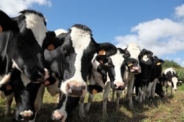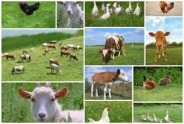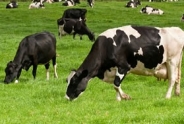Alternative Risk Management Strategies for Today's Farm Business Owners
John Hanchar, Farm Business Management Specialist
Northwest New York Dairy, Livestock & Field Crops
July 5, 2013
This article is a follow up article to "Risks Faced by Today's Farm Business Owners," published in the fall of '05. This article draws from ideas and materials developed through USDA's Risk Management Agency's Risk Management Education Program.
RISK is a situation characterized by a range of possible outcomes where each outcome has some chance of occurring. Variability of an outcome, in contrast to a single, certain outcome typifies risk. The prior article described five sources of risk faced by today's farm business owners: production risk, price (market) risk; legal risk; human resource risk; and financial risk. Many farm managers are keenly aware of production risk due to last year's dry weather conditions, and price risk due to present supply and demand conditions for some commodities (like fuel in the present economy). Managers understand, too, the relationships among production, price and financial risk. Producers may be less aware of the other sources of risk - legal, and human resource risk.
Efforts to deal with the sources of risk faced by today's farm business owners will be more effective when the farm business manager understands that:
- A general framework based on management principles can effectively guide the manager.
- Alternative risk management strategies to reduce variability in outcomes exist.
- People are key to successfully developing and implementing a risk management plan.
A General Framework
Planning
- Establish written objectives and goals.
- Identify the production, borrowing, contracting, and spot selling alternatives available.
- Estimate costs and returns using forward price information.
- Evaluate risks and risk bearing capacity.
- Arrange loans, purchase inputs, and contract outputs.
- Initiate and carry out production or storage.
- Adjust to new information about price and yield prospects as needed.
- Deliver the product, close out any futures or option hedges, and repay loans.
- Evaluate results and take corrective actions if necessary when formulating future strategies.
Alternative Strategies for Managing Production Risk
Enterprise Diversification: Diversification, the combining of different production processes for generating income, can include different crops, combinations of crops and livestock, different end points (such as different selling weights), or different types of the same crop. Diversification is most effective when low income from one enterprise is simultaneously offset by satisfactory or high incomes from other enterprises. Diversification is becoming increasingly costly as capital investment requirements become greater.
Crop insurance: The purchase of crop insurance transfers risk from the farm business owner to others for a price, the insurance premium. Crop insurance in the form of the basic Multiple Peril Crop Insurance (MPCI) program protects against yield short falls by providing coverage against most natural disasters. New insurance products that protect against revenue losses (combination of production and price) are in development and pilot stages.
Input Use & Management Information: A farm business manager’s decisions regarding input use are major means to reduce production variability. For example, the use of pest control and disease prevention measures help to reduce variability in production. The farm business manager can utilize management information, for example measures of animal performance, to identify problem areas for the purpose of reducing production variability.
Alternative Strategies for Managing Market (Price) Risk
Brief reviews of some popular strategies for managing price risk follow:
Storage: Storage may be warranted when there is a realistic expectation of a market price increase. Historical data indicate that the market is often willing to pay storage costs.
Cash Sale: When prices are favorable, a direct cash sale is warranted.
Contract Production: Through production contracts, the agribusiness firm commits the producer to deliver a specific quality and quantity of final product. The producer must comply with the firm’s quality specifications and must manage yield risk with insurance, and sound management practices.
Forward Cash Contract: With this agreement, the farm business manager establishes a final price for a commodity that he/she is storing or expecting to raise.
Sell a Futures Contract: Farm business managers can sell a futures contract to protect the value of grain or livestock in inventory, or the value of expected production. The futures contract is an obligation that specifies a delivery month, price, quality and quantity for a commodity. The farm business manager that sells a futures contract reduces downside price risk, but forgoes opportunities to capture upside price gains.
Buy a Put Option: Agriculture put options convey the right, but not the obligation, to sell a specified futures contract at a set “strike price.” In exchange for that right, the buyer of the put option pays the seller a fee or premium. The put option sets a floor on the crop or livestock price throughout the life of the contract, but allows the buyer to capture upside price gains.
Minimum Price Contract: The farm business owner sells grain to the elevator for a fixed price, less the cost of a call option (the opposite of a put option) selected by the owner. If prices rise, the owner may be able to add to the selling price. If the market does not rise, the owner receives the guaranteed minimum price.
Hedge-to-Arrive Contract: This contract has risk management properties similar to selling futures contracts. The contract permits the seller to set the futures price level by the delivery date, while determining the basis (the difference between the local cash price and a futures contract price) later. The seller is responsible for delivering the contracted amount on the delivery date.
Alternative Strategies for Managing Legal Risk
General Business Liability Insurance
Farm business managers carry general business liability insurance in response to the risk that someone will file a civil suit against the farmer. Suits arise, because of negligent or intentional injury to property or people by the farmer, farm employees or family members in the course of conducting farm business.
Pollution Liability Coverage
Lately, the types of injuries being claimed have expanded to include situations where adjacent landowners, public groups, or others assert liability for damage to air and water quality due to agricultural activity. Many newer liability policies exclude coverage for pollution claims, entirely. Farm business owners can purchase special pollution policies to reduce risk.
Managing to Achieve Environmental Objectives
Liability insurance affords no protection from criminal penalties assessed against a farmer by a regulatory agency. The farm business manager can greatly reduce criminal liability exposure by developing and implementing plans for achieving business as well as environmental objectives and goals. The monitoring of outcomes that includes collecting information on pesticide, purchased fertilizer, and manure use is important.
Alternative Strategies for Managing Human Resource Risk
Modern Personnel Management Practices
Modern personnel management practices for selecting, motivating and retaining employees increase the likelihood that employees will consistently achieve, or exceed desired levels of performance over time.
Formal Planning & Management Systems
These help everyone focus on the right priorities. Systems allow the business to function during periods of employee illness or absence.
Estate Planning
An effective estate plan provides family members and business partners with a plan for continuing the business with the least amount of disruption.
Alternative Strategies for Managing Financial Risk
Farm Records & Financial Analysis
The farm business manager should seek to manage financial risk through sound planning and financial control. A set of well maintained financial records is an absolute necessity to maintaining financial control of a farm business.
Insurance
When needed, proper life insurance coverages and protection, for example, contribute to adequately meeting cash flow requirements.
People as a Key to Managing Risk
The farm business manager that recognizes that people are key to successfully developing and implementing the risk management plan for the business is likely to achieve desired results. USDA’s Risk Management Agency recognizes the important role of people in managing risk. The agency stresses in their Risk Management Education Program that the farm business manager of today will do well to consider the grain elevator operator, commodity broker, crop insurance agent, loan officer, extension educators, commodity organizations, cooperatives, lawyers, accountants, and the people in local USDA offices as valuable human resources when managing risks.
Upcoming Events
Western NY Value-Added Dairy Discussion Group: Shtayburne Farm Creamery
May 16, 2024
Rock Stream, NY
Registration for this discussion group is required and limited.
Cornell Cow Convos Podcast- Episode 9 Release
May 23, 2024
Cornell Cow Convos-Episode 9
Parasite Management of Sheep & Goats
June 15, 2024 : Parasite Management of Sheep & Goats
Albion, NY
Learn about internal parasites of sheep and goats. Participation in the day will earn FAMACHA© certification.
Announcements
Follow us on Instagram
See photos and reels of our most recent events and programs!Join us on Facebook!
Follow us on Facebook to get up to date posts about events, workshops and everything NWNY!Add us on LinkedIn!
Connect with us on LinkedIn to get more information about upcoming workshops and programs!





